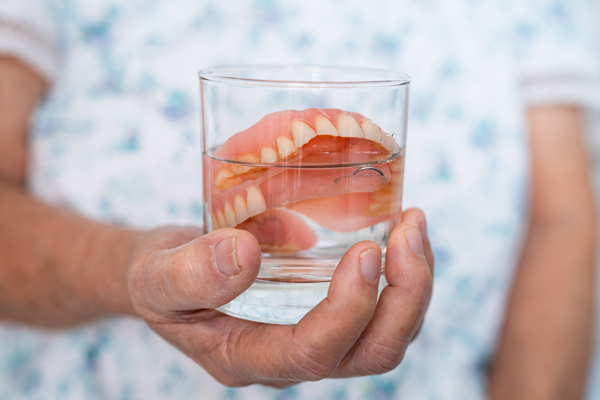Adjusting to New Dentures: When You Should Replace Your Old Dentures

Adjusting to new dentures is a familiar feeling to the 36 million Americans that have no teeth, according to the American Dental Association (ADA). Dentures allow those Americans to eat and speak normally when they have lost their natural teeth to age, gum disease, or dental trauma. Unfortunately, even the best dentures are expected to last only 7-10 years. If you are unsure whether it is time to replace your dentures, keep these signs in mind.
Changes in fit
Commonly, dentures stay in place through implants, a close fit to the gums and jaw bone or, for partials, a clasp that fits onto a natural tooth. All of these are custom-made to match your mouth's anatomical structure. However, when teeth are missing, this structure is not always constant. Other teeth settle into a new position, gums shift or recede, and jawbones shrink as they are resorbed. Consistently wearing your dentures helps fix teeth and gums in place, and exercising your jaw can prevent bone resorption. However, some changes are still to be expected over the years. Left unaddressed, loose dentures not only cause discomfort and difficulty in talking and eating; they may also irritate gum tissue or trap food and plaque, leading to sores and lesions that further worsen the issue.
Often, it is apparent when dentures are loose because they shift or even fall out. You can also tell that you may have a fit issue if they make a clicking sound when you eat or speak, or if you have a hard time speaking clearly. Your dentist may also detect changes in your mouth's structure during regular visits by taking impressions and comparing them to previous ones.
Relining dentures
For relatively new dentures, a complete replacement may not be necessary if they stop fitting properly. Instead, if the changes are minor, a dentist can reline your dentures in the office. The process consists of adding or replacing the base material where it comes into contact with the gums. Relining saves you the cost of full replacement and the period of adjusting to new dentures. You can talk to your dentist about this option during your regular visits.
Damage and wear
Taking good care of your dentures extends their lifespan and keeps them fitting properly. Still, accidents can occur and regular use does wear on the materials. Besides teeth chipping or breaking off, signs of damage to your dentures include:
- Deterioration of materials
- Stained or discolored teeth, typically caused by the formation of cracks
- Visibly bent or warped base
- Irritated gums or tongue
- Pain and discomfort while chewing or speaking
- Unexplained pain or discomfort in the jaw or neck
Attempting to fix damaged dentures on your own is not recommended, especially fixing the base, as this is likely to worsen the issue.
Damage can be mitigated through proper care: regular brushing and cleaning with cold water and approved cleaning solutions. Do not use abrasive materials or products containing bleach or peroxide. Also, avoid chewing or biting down on very hard foods.
Conclusion
While adjusting to new dentures is rarely enjoyable, your old ones eventually need to be replaced. Be aware of signs of damage or changes in fit to know when it is time to invest in a new set.
Request an appointment here: https://www.ddslansing.com or call Downtown Dental Studio at (517) 481-2569 for an appointment in our Lansing office.
Check out what others are saying about our dental services on Yelp: Adjusting to New Dentures in Lansing, MI.
Related Posts
It is essential to replace missing teeth the moment they fall out. Failing to do so can lead to serious health issues. Teeth serve an important function: They help people break down foods, pronounce certain words and their roots keep your jawbone tissue healthy.When some of a person's teeth are missing, there are changes that…
Keeping your appointments with your family dentist can help keep your mouth healthy. This dental health professional knows how to relax and calm patients of every age. Knowing your dentist’s abilities can give you peace of mind that you are in good hands. Here are the details on how your family dentist can improve your…
A smile makeover can transform not only the appearance of teeth, but also the way a person feels in social and professional settings. When the color, shape, or alignment of teeth causes hesitation, a smile makeover offers a structured way to address those concerns. Modern cosmetic dentistry combines art and science to create natural-looking improvements…
Dental implant restoration is a reliable and long-lasting solution for replacing missing teeth. However, caring for and maintaining your dental implant from the start is important to get the best results. A consistent oral hygiene routine and regular dental visits are necessary to protect this investment in your long-term oral health.Brushing and flossing are essential…
